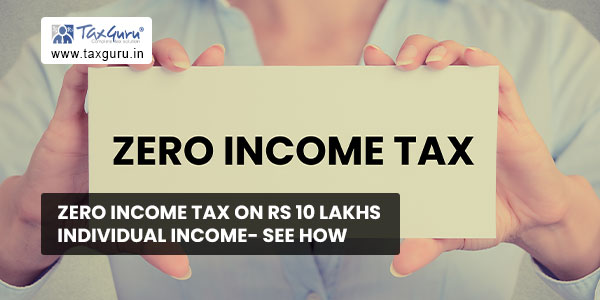It is common knowledge that the Income Tax on income of Rs.10 lacs in Individual status entails payment of Income Tax of Rs. 1,17,000/-. But, if you plan well, you need not pay any Income Tax on your individual income of Rs.10 lacs.
The Government in order to boost savings and provide Tax respite has legislated a number of exemptions under different heads for the benefit of the individual assessees. Although the basic exemption limit under the Income Tax Act is only Rs. 2.5 lakhs but by availing the various available exemptions, an individual assessee may pay Zero Tax up-till the income of Rs 10 lakhs and thereby save his hard earned money. Even otherwise, with the help of these deductions and exemptions one could reduce his/her tax substantially.
The art of saving on income tax is not very difficult but basic knowledge of Income Tax is required. Let us see what exemptions can be availed so as to reduce the tax liability of an individual.
1. If you are a salaried person, you can avail deduction of Rs. 50,000/- as ‘Standard Deduction’ u/s 16(ia) of the Income Tax Act.

2. Any individual can claim exemption under Section 80C of the Income Tax Act wherein one can claim a maximum of Rs 1,50,000/- by contributing to EPF, PPF, ELSS, NSC etc. or paying LIC premium of self or spouse or children. Payment of tuition fees for two children is also exempt under this section. Contribution to PPF is beneficial on two counts. Firstly, the interest on PPF is wholly exempt from Income Tax non u/s 10(11) of the Income Tax Act. Secondly the amount standing in the PPF account cannot be attached by any authority/Court.
3. An additional Rs 50,000 can be claimed as exemption for contribution in the National Pension System (NPS) scheme under section 80CCD (1B) of the Income Tax Act.
4. If an individual has taken a home loan and he repays interest over Rs 2 lakhs, then he can claim under section 24B of Income Tax upto a maximum amount of Rs. 2 lakhs from his taxable income.
5. An exemption of Rs 25,000 can be availed for payment of health insurance premiums for health insurance of self, spouse & children under Section 80D of the Income Tax Act. However, if an individual pays health insurance of his senior citizen parents, an additional exemption of Rs 50,000 can be availed.
6. An individual can claim a preventive health check-up deduction for up to Rs 5,000 per financial year under Section 80D. This preventive health check-up deduction is included within the aforementioned 80D limit of Rs 25,000 for individuals and Rs 50,000 for senior citizens.
7. A further exemption u/s 80 DDB of the Income Tax Act towards medical treatment of certain specified ailments availed for self or a dependent can be availed. The dependent can be spouse, parent or sibling. The exemption is available for medical expenses of Rs. 40,000/- per annum. However, in respect of medical expenses of a dependent senior citizen this exemption is Rs. 1,00,000/-.This exemption is over & above the exemption u/s 80D of the Income Tax Act.
8.An exemption can be claimed under 80 G of the Income Tax Act for donation to organisations registered under Section 80G of Income Tax. Section 80G of the Income Tax Act, 1961 offers income tax deduction to an assessee, who makes donations to charitable organisations. This deduction varies based on the receiving organisation, which implies that one may avail deduction of 50% or 100% of the amount donated, with or without restriction.
Thus, the assessee should manage his financial affairs and invest in such a way that his taxable income comes down below Rs 5 lakh so that there is no incidence of Income Tax as mandated in Section 87A of the Income Tax Act.






80 G option can be availed by the person who desires to donate actually . If you can spare the money then and then you will donate . Donation is good but for the purpose of reducing tax liability donation can not be made . Those who have donated can avail this deduction . Those who want to reduce tax liability donation is not made . First donation is made willingly then deduction can be availed for the amount which you have donated . No one will donate for the purpose of reducing tax liability .
Everyone say how to reduce tax with investingi.e., outflow of cash.But,no one says how to reduce tax without investing.
the article does talk about benefits to super senior citizens and stops at senior citizen.
i have a feeling gong through articles about taxation on internet that super senior citizens have more advantages than described by mr jain .
tax guru also forgets super senior citizens
taxpaying super senior population is increasing every year .hope tax guru and authors on taxation will not forget mentioning super senior citizens advantages or dis advantages
80 G option is golden one. Using this option, higher income group person can make his tax zero.